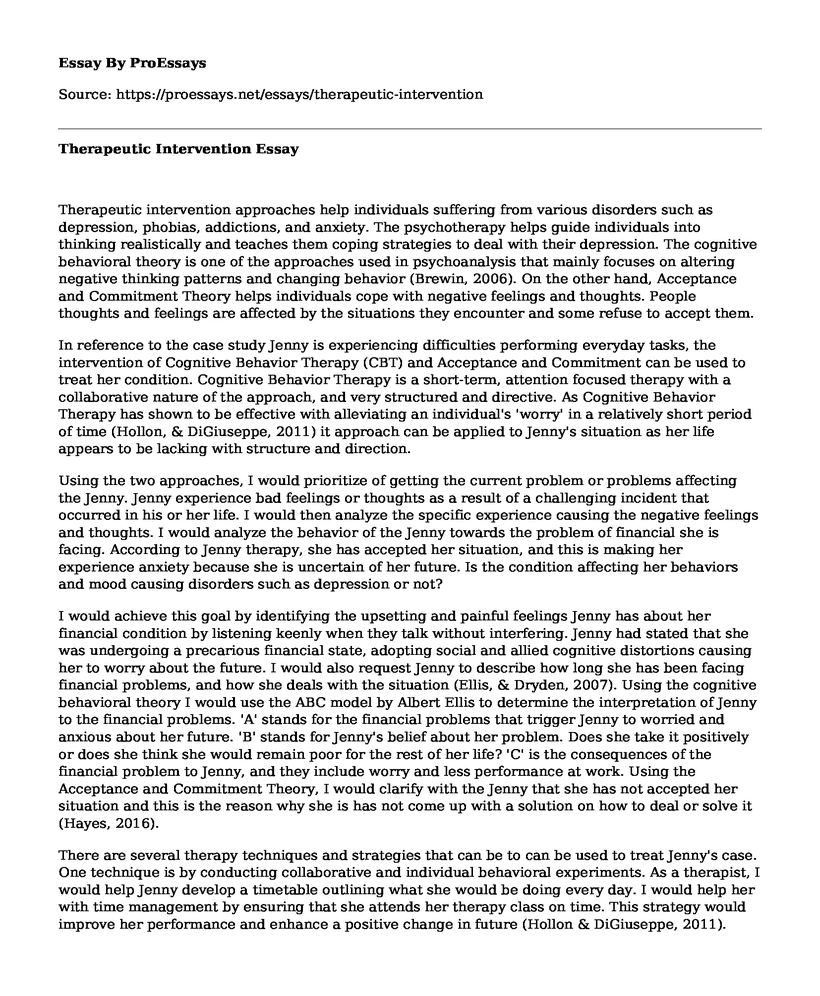Therapeutic intervention approaches help individuals suffering from various disorders such as depression, phobias, addictions, and anxiety. The psychotherapy helps guide individuals into thinking realistically and teaches them coping strategies to deal with their depression. The cognitive behavioral theory is one of the approaches used in psychoanalysis that mainly focuses on altering negative thinking patterns and changing behavior (Brewin, 2006). On the other hand, Acceptance and Commitment Theory helps individuals cope with negative feelings and thoughts. People thoughts and feelings are affected by the situations they encounter and some refuse to accept them.
In reference to the case study Jenny is experiencing difficulties performing everyday tasks, the intervention of Cognitive Behavior Therapy (CBT) and Acceptance and Commitment can be used to treat her condition. Cognitive Behavior Therapy is a short-term, attention focused therapy with a collaborative nature of the approach, and very structured and directive. As Cognitive Behavior Therapy has shown to be effective with alleviating an individual's 'worry' in a relatively short period of time (Hollon, & DiGiuseppe, 2011) it approach can be applied to Jenny's situation as her life appears to be lacking with structure and direction.
Using the two approaches, I would prioritize of getting the current problem or problems affecting the Jenny. Jenny experience bad feelings or thoughts as a result of a challenging incident that occurred in his or her life. I would then analyze the specific experience causing the negative feelings and thoughts. I would analyze the behavior of the Jenny towards the problem of financial she is facing. According to Jenny therapy, she has accepted her situation, and this is making her experience anxiety because she is uncertain of her future. Is the condition affecting her behaviors and mood causing disorders such as depression or not?
I would achieve this goal by identifying the upsetting and painful feelings Jenny has about her financial condition by listening keenly when they talk without interfering. Jenny had stated that she was undergoing a precarious financial state, adopting social and allied cognitive distortions causing her to worry about the future. I would also request Jenny to describe how long she has been facing financial problems, and how she deals with the situation (Ellis, & Dryden, 2007). Using the cognitive behavioral theory I would use the ABC model by Albert Ellis to determine the interpretation of Jenny to the financial problems. 'A' stands for the financial problems that trigger Jenny to worried and anxious about her future. 'B' stands for Jenny's belief about her problem. Does she take it positively or does she think she would remain poor for the rest of her life? 'C' is the consequences of the financial problem to Jenny, and they include worry and less performance at work. Using the Acceptance and Commitment Theory, I would clarify with the Jenny that she has not accepted her situation and this is the reason why she is has not come up with a solution on how to deal or solve it (Hayes, 2016).
There are several therapy techniques and strategies that can be to can be used to treat Jenny's case. One technique is by conducting collaborative and individual behavioral experiments. As a therapist, I would help Jenny develop a timetable outlining what she would be doing every day. I would help her with time management by ensuring that she attends her therapy class on time. This strategy would improve her performance and enhance a positive change in future (Hollon & DiGiuseppe, 2011). Jenny's financial problem is making to overthink which can cause depression. As a therapist, I would motivate her by teaching her that it is normal to be broke because it trains one to be responsible. I would also explain that the situation does not last forever and if she works hard on her sources of income soon she would be over it. This strategy would reduce her overthinking, and improve her belief about money. More so, it can help with making Jenny aware that her anticipation of work has caused cognitive, behavioral and physiological disturbances, causing a fall back with her performing everyday tasks. Modifying Jenny's cognitions and thinking may provoke her to change her behavior and thoughts (Brewin, C. R. (2006). Improve Jenny's self-esteem by showing her that it is possible to achieve make money once she acquires a positive belief (Adler, Strunk, & Fazio, 2015).
References
Hollon, S. D., & DiGiuseppe, R. (2011). Cognitive theories of psychotherapy. History of psychotherapy: Continuity and change, 203-241.
Hayes, S. C. (2016). Acceptance and Commitment Therapy, Relational Frame Theory, and the Third Wave of Behavioral and Cognitive Therapies-Republished Article. Behavior therapy, 47(6), 869-885.
Brewin, C. R. (2006). Understanding cognitive behavior therapy: A retrieval competition account. Behavior research and therapy, 44(6), 765-784.
Ellis, A., & Dryden, W. (2007). The practice of rational emotive behavior therapy. Springer Publishing Company.
Adler, A. D., Strunk, D. R., & Fazio, R. H. (2015). What changes in cognitive therapy for depression? An examination of cognitive therapy skills and maladaptive beliefs. Behavior therapy, 46(1), 96-109.
Cite this page
Therapeutic Intervention. (2022, Jun 06). Retrieved from https://proessays.net/essays/therapeutic-intervention
If you are the original author of this essay and no longer wish to have it published on the ProEssays website, please click below to request its removal:
- Nursing Models and Theories Annotated Bibliography
- Discussion on the Current Research That Links Patient Safety Outcome to ADN and BSN Nurses
- Infectious Diseases and Modern-Day Stressors Paper Example
- Wells Fargo Scandal Essay Example
- Smoking Cessation Among Adult and Geriatric in a Primary Care Clinic Essay Example
- Essay Example on Abortion Debate: Right or Wrong?
- Paper Sample on Self-Care: Essential Practice for Attitude & Well-Being







